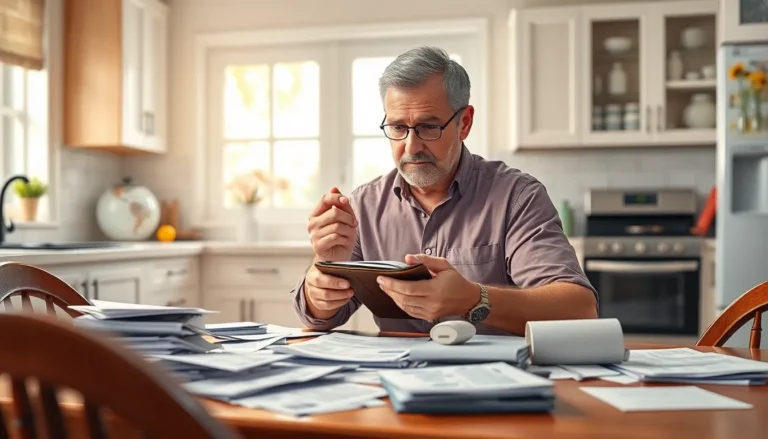In a world where every dollar counts and the price of avocado toast seems to rise faster than the sun, embracing a frugal lifestyle isn’t just smart—it’s essential. Who wouldn’t want to save a little cash while still enjoying life’s little pleasures? With a few clever hacks, it’s possible to live large on a small budget.
Table of Contents
ToggleUnderstanding Frugal Lifestyle Hacks
Frugal lifestyle hacks offer practical ways to save money while enjoying life. Adopting these methods can enhance financial health and provide peace of mind. Individuals often find satisfaction in creatively managing resources. Learning to budget effectively allows people to allocate funds wisely, prioritizing necessary expenses over indulgences.
Emphasizing resourcefulness, entrepreneurs frequently explore side gigs to supplement income. Others may utilize cashback apps or loyalty programs to maximize savings on everyday purchases. Embracing minimalism simplifies decision-making and reduces unnecessary expenditures. When making purchases, considering secondhand options can yield significant savings while promoting sustainability.
Traveling on a budget encourages creativity in planning trips. Frequent travelers often seek deals on accommodations or transportation, benefiting from off-peak travel. Cooking at home can also reduce food costs substantially. Many individuals find joy in experimenting with new recipes, transforming leftovers into delicious meals.
Finding free or low-cost entertainment enhances social interactions without breaking the bank. Community events, local parks, and libraries offer various engaging options. Participating in skill-sharing groups fosters a sense of community and provides opportunities to learn new skills at no cost.
Prioritizing needs over wants leads to smarter financial decisions. Individuals often experience a sense of empowerment by understanding their spending habits. Small, consistent changes can lead to significant savings over time. Utilizing frugal lifestyle hacks encourages individuals to live consciously and enjoy life more fully.
Benefits of Adopting a Frugal Lifestyle
Adopting a frugal lifestyle brings numerous advantages, particularly in a fluctuating economy. Key benefits include financial savings and a positive environmental impact.
Financial Savings
Financial savings stand out as a primary benefit of frugality. Cutting unnecessary expenses leads to increased disposable income. Prioritizing needs over wants allows for smarter spending decisions. Individuals who use cashback apps and loyalty programs enjoy enhanced savings on everyday purchases. Many discover that budgeting effectively helps track their finances and identify areas for improvement. Even small changes, like cooking at home, can significantly reduce food costs. Embracing minimalism often results in less clutter and a better understanding of personal priorities. This collective approach not only enhances financial health but also fosters a sense of empowerment.
Environmental Impact
Adopting a frugal lifestyle positively impacts the environment. Choosing secondhand items reduces waste and promotes sustainability. Individuals who prioritize reuse contribute to less demand for new products, resulting in lower resource extraction. By minimizing consumption, they help decrease their carbon footprint. Exploring low-cost or free entertainment options encourages a shift away from materialism, fostering a culture of appreciation for experiences over possessions. Many find that frugal practices lead to a more mindful approach to consumption. Sustainable choices not only benefit the individual budget but also support a healthier planet for future generations.
Essential Frugal Living Tips
Frugal living can lead to substantial savings. Here are some effective strategies to incorporate into daily life.
Budgeting Techniques
Establishing a budget significantly enhances financial awareness. Tracking income and expenses helps identify spending habits. Creating categories allows individuals to allocate funds for necessities while limiting discretionary spending. Adopting the 50/30/20 rule provides a structured approach: 50 percent for needs, 30 percent for wants, and 20 percent for savings. Utilizing budgeting apps offers a convenient way to monitor financial goals in real time. Adjusting budgets monthly ensures they remain relevant and effective as circumstances change.
Meal Planning Strategies
Planning meals efficiently can reduce grocery costs and minimize food waste. Preparing a weekly menu simplifies shopping by prioritizing ingredients to purchase. Making a shopping list based on this plan avoids impulse buys and ensures only essential items are acquired. Cooking in batches saves both time and money, as individuals can take advantage of bulk buying. Embracing versatile recipes enables creativity with leftover ingredients, further maximizing food usage. Experimenting with seasonal produce often leads to healthier meals at lower prices.
Effective Money-Saving Techniques
Frugal living incorporates various practical strategies to save money. Implementing specific techniques enriches financial health and enhances lifestyle.
Thrifting and Second-Hand Shopping
Thrifting serves as an effective way to acquire clothing and household items at a fraction of retail prices. Discount stores and online marketplaces offer vast selections. Shoppers can often find high-quality brands among gently used items. Choosing second-hand goods not only conserves cash but also supports sustainable practices. Many community thrift stores donate profits to local charities, thereby benefiting society. Prioritizing these options means individuals enjoy unique finds while reducing their environmental footprint.
DIY Projects and Upcycling
DIY projects provide creative avenues for saving money while enjoying hands-on activities. Many resources are available online, offering step-by-step guides for various projects. Upcycling transforms old furniture and materials into functional pieces, giving them new life. Crafting homemade decorations or gifts encourages personal expression while cutting costs. Prioritizing such projects can lead to significant savings compared to purchasing new items. Engaging in DIY endeavors fosters creativity and enhances satisfaction derived from personal accomplishments.
Lifestyle Changes for Long-Term Frugality
Embracing a frugal lifestyle requires tangible changes that foster sustainability and savings. Individuals can adopt meaningful habits that lead to lasting financial wellness.
Minimalism
Practicing minimalism simplifies life. It encourages people to prioritize quality over quantity. Focusing on essential possessions reduces clutter, which can diminish impulse buying. Individuals often find satisfaction in owning fewer items that provide more value. Choosing experiences over material goods enables fulfilling moments without overspending. Decluttering creates space, both physically and mentally, for better financial decision-making. Prioritizing needs transforms spending habits, aligning purchases with core values.
Sustainable Habits
Sustainable habits contribute significantly to a frugal life. Choosing to use reusable bag and containers minimizes waste and saves money in the long run. Adopting energy-efficient appliances cultivates savings through reduced utility bills. Buying local produce not only supports the community but often costs less than imported items. Individuals who preserve food through canning or freezing decrease grocery expenses and reduce spoilage. Regular maintenance of belongings extends their lifespan and prevents costly replacements. Committing to these practices creates a culture of frugality and environmental mindfulness.
Adopting a frugal lifestyle opens doors to financial freedom and sustainability. By implementing practical hacks and prioritizing needs over wants, individuals can enjoy a fulfilling life without overspending. Embracing minimalism and seeking secondhand options not only reduces waste but also fosters creativity and resourcefulness.
The journey toward frugality is about making intentional choices that enhance both personal finances and the environment. With small consistent changes, anyone can cultivate a more conscious lifestyle that supports their financial goals. Ultimately, frugal living isn’t just about saving money; it’s about enriching life experiences while contributing to a healthier planet for generations to come.









